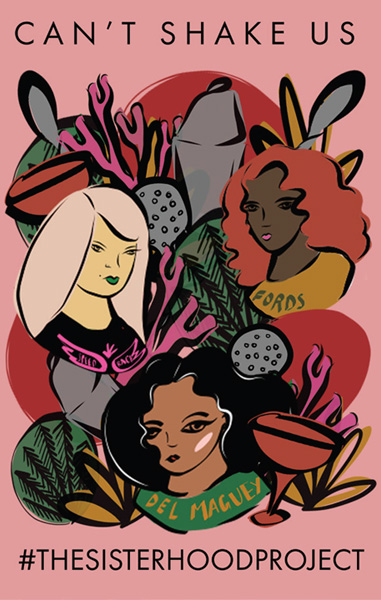“People equate alcohol with disinhibition and permission,” says Lauren Taylor, director of Safe Bars, a nightlife advocacy group based out of Washington, DC. Before they even take the first sip, people tend to loosen up, become more intimate and relaxed. Drinking can be a catalyst for an enjoyable night out, but it can also inspire inappropriate conduct on both sides of the bar.


Taylor launched Safe Bars in 2015, when she realized that violence against bartenders has become a significant issue in the industry. The pervasiveness of the problem emerged during a class she was teaching in her existing program, Defend Yourself, which combats gender-bias violence. After an attendee asked about bartender resources, Taylor went home, searched, and found very little in the way of programs. But, she says, “There was a lot [of research] on sexual aggression in bars, clubs, restaurants, on the relationship between alcohol and sexual assault.”
As she points out, there aren’t many industries that require working long shifts in cramped, dark quarters doling out alcohol to people; a female bartender in the corner well may be left attending to a patron who’s behaving inappropriately, leading to physical and emotional unease.
It is, after all, the patron who pays the bartender’s income. “Tipping creates a subservient relationship with patrons,” Taylor notes, adding that some may exploit that. Having tended bars both in cocktail bars and restaurants in Texas, I can attest to this personally. When regular patrons commented on my appearance or insisted on a goodbye hug, I had to calculate quickly how I could end the interaction subtly, without losing my pride or my tip.
The structure of the restaurant industry continues to aggravate the issue. Restaurant Opportunities Centers United, a national advocacy group promoting fair wages, has combed through job data and found that women tend to hold lower-paid positions in restaurants and are confined to specific sectors of the business, including positions that are more likely to be hourly and rely on tips. Its 2014 study, The Glass Floor, looked at the experiences of 688 restaurant workers, past and present, across the United States, and found that 66 percent had experienced harassing behavior from their management, 80 percent from their coworkers, and 78 percent from their customers. It concludes, “the already high levels of sex harassment are exacerbated by systems in which tipped restaurant workers—primarily women—endure legalized pay discrimination in the form of a sub-minimum wage.”
Chauntel Gerdes is a trauma therapist who works with Outsmart NYC, a newly formed organization of activists, clinicians, community workers and local bar staff. They regularly hold meetings focused on sexual harassment in the industry and raise money through featured cocktails at participating bars—the most recent at Brooklyn’s Leyenda, run by Ivy Mix, one of the few female bar owners in NYC. When necessary, the group also connects survivors of sexual violence with medical, legal and local resources.
While Gerdes and Taylor have found bartenders receptive to training for issues with customers, tackling the kind of transgressions that go on behind the bar is more challenging. So far, they’ve chosen to focus on “bystander staff training”—training bartenders to see and name the types of behavior they hope to change, and learn how to handle it, even when it happens to them. In the future, Taylor says, she hopes to develop a “boiler-plate code of conduct that establishments could adopt and adapt to their particular place.”
Several other groups have sprung up in the wake of #metoo, with the goal of building awareness around the issue of sexual harassment in bars. Misty Kalkofen of Del Maguey mezcal and Sharon Bronstein of Ford’s Gin, who sponsor the Sisterhood Project and Speed Rack competitions for female bartenders, hold gatherings around the country, in which sexual harassment is a key topic. Bronstein is also helping to launch Chicago Style this May. The three-day industry conference will focus on the issues of harassment and sustainable work environments at bars.
Despite the surge of interest in bartender advocacy programs, Taylor worries that it may not be enough. As she says, some people “don’t want to be seen dealing with the issue. It means admitting that there is [an issue], and that could mean bad things for them.” Along with Gerdes, she would like to see bar owners hold other bar owners in their communities accountable. And Gerdes mentions implementing regulations that require staff training on harassment issues before a bar or restaurant can receive a liquor license.
One of the essential qualities of a good bartender is the ability to deal with situations quickly as they arise and move on. But there won’t likely be any quick fixes to the culture of harassment in bars. One way to start—for people on both sides of the bar—is to notice and speak up.
This story was featured in W&S April 2018.
is the former W&S Tasting Director turned freelance writer for the Vintner Project.
This story appears in the print issue of April 2018.
Like what you read? Subscribe today.
















